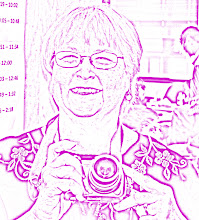I am not very good at it, I guess, but I did give it a try at the Celebration Of Teaching and Learning in NYC on March 5, 2010. See previous blog post. I did not lug my laptop with me, so the post I entered was from my iPhone, and I find it a bit laborious to type a lengthy entry from that communication tool. In addition, the whole debate on multi-tasking and whether or not we can really do it well was debated in the audience. I know I have a difficult time, when participating in webinars, to really attend to the speaker while I am contributing in the chat. I honestly don’t think kids can attend to a “lecture” from a professor while they are checking email, facebook, etc. as seems to be the practice at MIT.Obviously, I had trouble blogging while attending the live session.
It was a real thrill to see and listen to Rachel Dretzin and Doug Rushkoff in person. I even got to speak with Rachel personally after the session. I want to revisit the video, which can be viewed live, at the following site:
http://www.pbs.org/wgbh/pages/frontline/digitalnation/
I hope to make a video of my own and upload it to the site.
My superintendant asked me how I enjoyed the session, and I will paste some of my response to him here in this post. I would love for others to comment on what they think about the issues raised in the documentary.
I think we need to really evaluate the debate about the need for memorization –and how important it is to today’s students, most of whom have some sort of web-enabled phone at hand. Although some educational technologists dismiss the need to memorize, I feel we short change our students if we do not help them to exercise that ability to memorize (not for rote but for connection purposes).
In addition, the authors of the documentary focused on the segment where a student proclaims that he’s never read a book but gets the overview from Sparks notes online. I think even the most forward-thinking educational technologists would agree that a synopsis is not replacement for experiencing the original piece of literature. Then again, norms are changing! I don’t really know where I sit on this issue. Every school has differing opinions of which “classics” to read. I think student need to experience literature – even if they are forced to read a particular book by the curriculum for their class. Of course, how students discuss the book can be enhanced by technology. A teacher-led discussion should not be the only option. Using book groups, nings, shared reviews on line, fan-fiction blogs, etc. are just a few of many options available.
Finally, on the issue of digital citizenship, the presenters showed the clip of kids in Korea being taught (indoctrinated) in cyber ethics (top down) from the time they are very small. Doug Rushkoff questioned in the documentary whether this “top-down” method would work in the United States. It is clear that we need to teach this from a very early age. I haven’t had time to investigate, but I understand Carnegie Mellon has just made a curriculum aimed at k-12 available. Digital Citizenship most definitely needs to be an essential part of our curriculum from the earliest years of school right through and including higher education.
I have not even touched upon the whole issue of gaming and virtual environments that comprised a significant portion of the documentary, but that will have to wait for another post.
Wednesday, March 10, 2010
Subscribe to:
Post Comments (Atom)

No comments:
Post a Comment